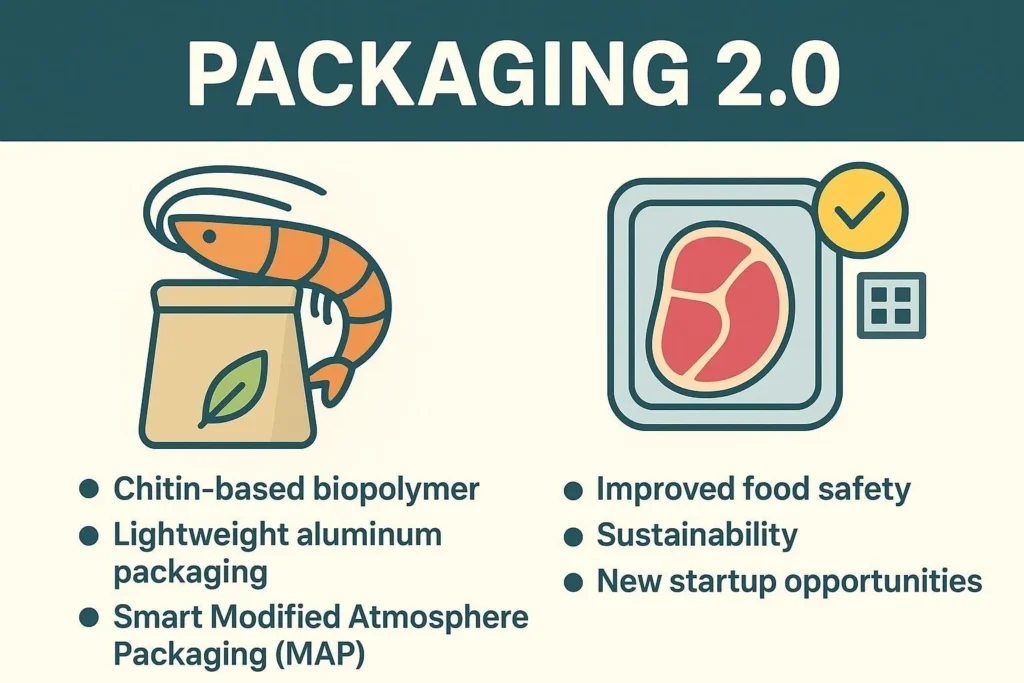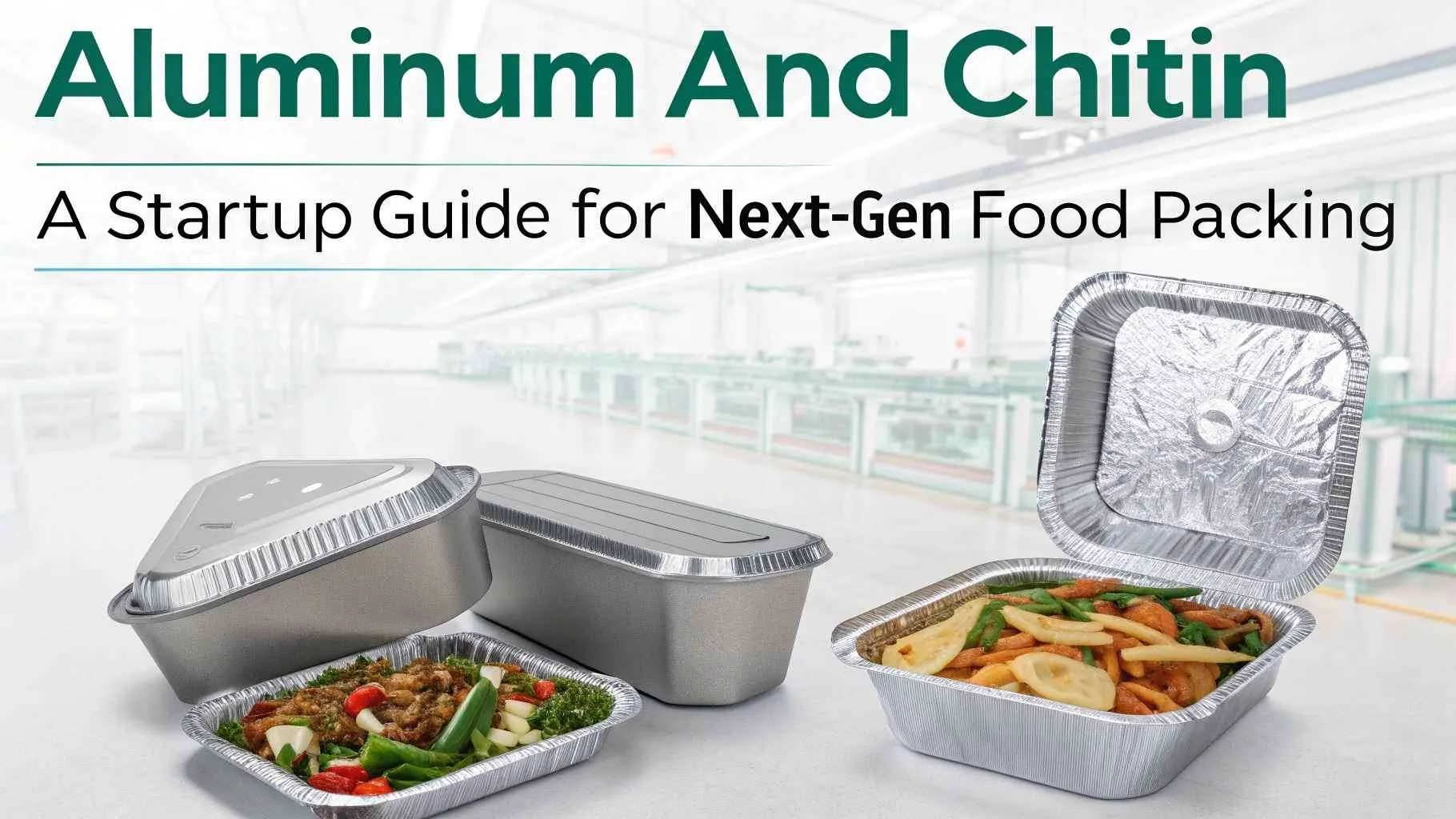Food safety and sustainability are no longer optional; instead, they are the two key engines driving innovation in the global packaging sector. In particular, India’s rapidly growing e-commerce market, stricter regulations, and rising consumer expectations are transforming the way food is packaged, preserved, and delivered.
Aluminum and Chitin, three emerging technologies are proving to be true game changers — namely, chitin-based biopolymer packaging, lightweight yet durable aluminum packaging, and smart systems such as Modified Atmosphere Packaging (MAP). Together, these innovations mark the dawn of Packaging 2.0 — a decisive shift away from conventional plastics towards intelligent, eco-friendly, and high-performance solutions. Ultimately, this transformation is creating new startup opportunities across the entire value chain.
1. Why Packaging 2.0 Matters for Startups
- Health and Safety: Food spoilage and contamination are serious challenges. New packaging solutions provide superior barrier and antimicrobial properties.
- Export-Driven Growth: International Markets Demand Stricter Packaging Regulations for Food.
- Sustainable Push: Government pressure and consumer pressure on reducing single-use plastics open the door for alternative materials.
- Premium Packaging: A modern packaging distinguishes brands and allows for higher margins.
Entrepreneurs are not just concerned with materials. They’re also interested in redefining the way food is transported from farm to table.
2. Market Landscape and Growth Potential
Global Market Snapshot
- The global food packaging industry is projected to reach USD 500 billion by 2025, with a CAGR between 5 and 6 percent.
- High growth in packaging made from bio-based materials, and packaging that uses smart technologies.
India Packaging Sector
- About 4% is contributed to the global packaging industry.
- The value of processed foods and packaged food is expected to double with the increase in demand.
- Due to the cost advantages and abundance of raw materials, there is a huge potential for exporting packaging materials.
It is a turning point for startups to enter niche segments with high value rather than compete on low-margin packaging.
3. Technology 1 – Chitin-Based Biopolymer Packaging
What Is Chitin Packaging
Chitin, a natural polymer, is derived from the shells of crustaceans such as shrimp and crab. Notably, it is both biodegradable and renewable, making it an excellent alternative to conventional plastics. Furthermore, chitin can be processed into thin films and composite materials, which can effectively replace plastics in various food packaging applications.
Key Benefits
- Compostable and Biodegradable: Addresses the plastic waste crisis.
- Antimicrobial Property: Increases shelf life by reducing microbial development.
- Edible Coatings: Safe to contact directly with food
Market Opportunity For Startups
- Create chitin-based films for packaging bakery, dairy, and fresh products.
- Exporters of fresh produce can use chitosan-based coatings.
- Export biopolymer film to Europe and North America, where eco-regulations will be the strictest.
Startup Angle
- Connect with clusters of seafood processing in coastal India to supply raw materials.
- Invest in medium-scale production units for the conversion of crustacean waste to high-margin packing materials.
- You can also seek technology transfer from institutions such as CFTRI and CSIR laboratories.
4. Technology 2 – Aluminum-Based Packaging
Why Aluminum?
Aluminum packaging is lightweight and highly recyclable. It also provides an excellent barrier to light, oxyge,n and moisture, which is critical in extending the shelf-life of processed food.
Key Benefits
- Durability: High mechanical resistance for transport and storage.
- Recyclability: Can be recycled indefinitely with no loss of quality.
- Premium Appearance adds perceived value for brands
Market Opportunity For Startups
- Produce aluminum foils and pouches with laminated foils for ready-to-eat meals.
- Aseptic packaging made of aluminum for dairy and beverage products.
- Export aluminum containers and closures to Middle Eastern markets and African markets.
Startup Angle
- Install aluminum foil laminating or rolling units near food processing clusters.
- Assist logistics providers in supplying standardized aluminum packaging to cloud kitchens and online food brands.
Related Article:- The Food Industry Revolution
5. Technology 3 – Modified Atmosphere Packaging (MAP) and Smart Systems
What is MAP?
Modified Atmosphere packaging replaces the air in a food package with a mixture of gases (like N2, CO2, etc.) to slow down spoilage. Combining sensors and smart labels creates an “intelligent package” that can monitor freshness.
Key Benefits
- Extended shelf life: Particularly for fresh meat, dairy products, bakery, and produce.
- Food safety: Reduces bacteria growth.
- Compliance with Export Standards: Meets the international standards for long-haul shipments.
Market Opportunity For Startups
- Exporters of fresh produce can benefit from MAP services.
- Develop affordable MAP Systems for MSMEs within the meat, seafood, and dairy sectors.
- Label premium products with smart labels that indicate freshness.
Startup Angle
- Offer turnkey MAP packages in partnership with packaging and gas suppliers.
- Integrate IoT to monitor packaged food in real time.

6. NPCS – Your Partner in Building a Packaging Venture
We, at Niir project Consultancy services (NPCS), provide professional consulting in the preparation of market survey cum Detailed Techno-Economic Feasibility Reports when setting up a new industry or business.
The following are included in our reports:
- Detailed manufacturing process
- Market Research and Demand Analysis
- Diagrams of process flow
- Product mix and capacity planning
- Details of machinery and raw materials
- Profitability analysis and full project financials
We aim to assist entrepreneurs in evaluating industrial projects for feasibility, profitability and scalability. Whether you are planning a chitin film unit, an aluminum tray plant, or a MAP facility, NPCS will design a roadmap that is tailored to your vision.
7. Import-Export Opportunities
Chitin-Based Packaging
- Exports: EU markets and the U.S.
- Imports Specialized equipment and additives to improve the properties of chitosan films.
Aluminum Packaging
- Exports: Foils and containers to the Middle East and Africa
- Imports: Aluminum sheets of high-grade and adhesives for laminating.
Smart Packaging and MAP
- Exports: High-value fresh produce and ready-to-eat meals using MAP (for long shelf life).
- Imports Advanced MAP machines and IoT sensors from Europe or Japan.
The government portals www.apeda.gov.in, www.mofpi.gov.in, and the MSME Minister can help entrepreneurs access incentives and markets
Related Book:- Aluminium and Aluminium Products
8. Government Support and Policy Framework
Key Agencies
- MoFPI: Grants for cold chain and packaging infrastructure under PMKSY.
- MSME Minister: Technology upgrade and credit-linked subsidies for new manufacturing units.
- APEDA Export Promotion for Agri-Food Products and Packaging Innovations.
- CPCB & State Pollution Boards: Approvals of biodegradable & recyclable packaging materials
Visit:
- https://www.mofpi.gov.in
- https://www.apeda.gov.in
- https://msme.gov.in
9. MSME Success Stories to Inspire New Entrepreneurs
Uflex, India’s Flexible Packaging Giant
As a small packaging films manufacturer, it has grown to become a global leader that supplies major FMCG companies worldwide. The company’s growth shows the importance of export markets and R&D.
Tube Packaging Innovator – Essel Propack
Developed laminated tubes that are widely used in oral care, cosmetics, and food packaging. Moreover, this article illustrates how niche packaging innovations can be strategically leveraged to create and expand global markets.
Marine Bio Solutions Sea6 energy – Marine Bio Solutions
It is a documentary that focuses on marine biomass but also shows how ocean resources, such as crustacean shells, can be used to create sustainable industrial products and packaging materials.
Tetra Pak India High-Tech Packaging
This video demonstrates how the combination of processing and packaging innovations can create food products that are ready for export. In addition, these examples highlight that packaging innovation is not limited to large corporations. On the contrary, agile MSMEs and startups can effectively dominate niche markets by leveraging the right technologies and strategic approaches.
10. Business Models for New Entrepreneurs
a. Biopolymer film producer
- Remove chitin by extracting crustacean shells.
- Convert to biodegradable coatings and films.
- Fresh produce exporters, premium food brands, and suppliers.
b. Manufacturer of Aluminum Foil and Trays
- Establish a rolling or lamination plant.
- Focus on airlines, catering companies, and producers of ready-to-eat meals.
c. MAP Service Provider
- Offer MSME food processors modified atmosphere packaging.
- Investing in mobile MAP units will allow you to service multiple clients.
d. Smart Packaging Startup
- Smart labels and freshness sensors based on IoT.
- Partners with retailers to sell high-value chilled or frozen products
11. Sector Challenges and How Startups Can Overcome Them
- High initial capital: Use government subsidy and phased investment.
- Technical know-how: Partner up with institutions such as CFTRI or IITs to do R&D.
- Supply chain coordination: Secure linkages for raw materials (e.g., seafood processors to obtain chitin).
- Complying: Achieve certifications of food contact safety, biodegradability, and other relevant factors.
- Market education: Increase awareness of the benefits of advanced packaging amongst consumers and B2B buyers.
Related project Report:- Aluminium and Aluminium Downstream Projects
12. Upcoming Trends in Packaging
a. Active Packaging
Antimicrobial agents can be added directly to the film for a longer shelf life.
b. Edible Coatings
Chitosan-based edible films reduce post-harvest loss on fruits and vegetables.
c. QR Code Traceability
Smart packaging embedded with QR codes allows consumers to track the origin, freshness and authenticity of products.
d. Circular Economy Focus
Packaging startups support closed-loop recycling programs and composting.
13. Point-Wise Suggested Products and Opportunities
1. Antimicrobial Films Based on Chitosan
- Use reusable plastics for bakery and fresh products.
- Exporters who want to comply with EU regulations can contact us.
2. Aluminum Meal Trays For Airlines
- Provide lightweight, recyclable trays that are superior in food safety.
- Contracts with airlines and catering companies for high-volume services.
3. Packaged fresh produce in Modified Atmosphere
- Exporters of fruits and vegetables can benefit from turnkey solutions.
- Reduce wastage and increase shelf life.
4. Smart labels and IoT sensors
- The freshness indicator for meat, dairy, and seafood products.
- Build a SaaS-based platform for real-time supply chain tracking.
5. Composite Packaging Solutions
- Use aluminum and biopolymers to create premium packaging.
- Export markets and premium FMCG brands are supplied.
14. Action Plan for Aspiring Entrepreneurs
- Perform a Feasibility Analysis: Work closely with NPCS in order to determine costs, market size, and ROI.
- Take advantage of government schemes: Request support from the MoFPI or MSME for upgrading infrastructure and technology.
- Create a Branding Strategy: Emphasize sustainability, safety, and compliance.
- Create export networks: Take advantage of APEDA buyer-seller meetings and international trade shows.
- Investing in quality and R&D: Partnering with institutions to innovate products.
Conclusion – Seizing the Packaging 2.0 Opportunity
India’s packaging industry is on the brink of a major transformation. With this shift, entrepreneurs now have a wide range of opportunities — from smart gas-flushed packages to aluminum foils and crustacean shell-based materials.
Furthermore, startups can lead this revolution by prioritizing sustainability and regulatory compliance. In doing so, they will not only supply innovative materials but also develop integrated, end-to-end packaging solutions that enhance food safety, minimize waste, and unlock new export opportunities.
Moreover, with the support of government initiatives, guidance from industry institutions, and strategic partnerships — such as those with NPCS, which conduct detailed feasibility studies — entrepreneurs can successfully transform Packaging 2.0 into a profitable and scalable business model..
How NPCS Can Help You
NPCS (Niir Project Consultancy Services) provides end-to-end support for entrepreneurs, including:
- Detailed Project Reports (DPR).
- Financial modeling & ROI analysis.
- Plant layout & machinery selection.
- Vendor & buyer connect.
- Licensing & compliance guidance.
With expert support, your chances of success in this high-growth sector increase significantly.
Niir Project Consultancy Services
106-E, Kamla Nagar, Opp. Mall ST,
New Delhi-110007, India.
Email: info@entrepreneurindia.co
Mobile: +91-9097075054
Website:https://www.entrepreneurindia.co






